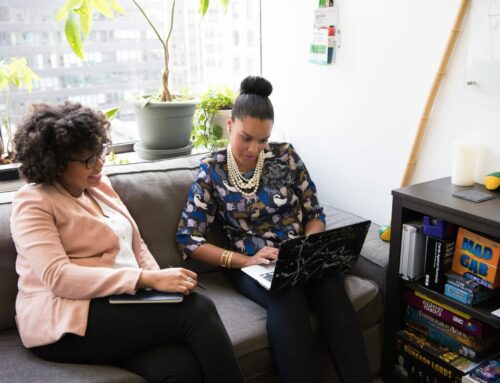Soft skills are characteristics and abilities, such as resourcefulness and leadership, that help cultivate positive working relationships between coworkers, clients, and management. Not only do soft skills enhance collaboration, communication, and customer service, but they also lead to increased productivity, job satisfaction, and overall success.
In this article, we will identify some of the most important soft skills in the workplace. We will also explain how to demonstrate these skills during your job interview and list them on your resume.
What are soft skills vs hard skills?
First, let’s define soft skills in the workplace: Often referred to as “people skills,” soft skills are characteristics and abilities, such as flexibility and professionalism, that help people interact with coworkers, clients, and management in a positive and productive manner. Soft skills help foster positive work environments with greater morale, efficiency, and inclusion. They can also do wonders for a company’s reputation. This is why they are so valuable in the workplace.
“Hard skills” are technical skills needed to complete a job. These skills are easily measurable and are often industry-specific. For example, if you’re a carpenter, some of your hard skills may include hanging drywall, installing windows, and exterior painting. If you’re a designer, some of your hard skills may include knowing how to use Photoshop or InDesign.
While your hard skills will determine whether or not you are qualified for a specific position, your soft skills may determine whether or not a company wants you to work for them. This is why knowing how to talk about soft skills in the workplace is so important. After all, you’ll need to make a good impression to get the job!
List of soft skills for resume
There are lots of soft skills needed in the workplace. After perusing the list below, take note of any skills that resonate with you. Then choose your top 5 soft skills. These are the soft skills you’ll want to include on your resume. Remember, soft skills play an invaluable role in the workplace. Even though they aren’t as easy to quantify as hard job skills, they are just as important!
How to demonstrate soft skills during an interview
While you’ll only want to list 3-5 soft skills on your resume, you’ll have the opportunity to highlight more soft skills during a job interview. This is why it’s important to identify your soft skills and practice talking about them.
Part of the reason why hiring managers conduct interviews is to learn more about your values, habits, perspectives, and work ethic to see if you would be a good “culture fit” for the company. In preparation, review common interview questions and rehearse answers that highlight your soft skills. You’ll also want to review The Most Important Questions to Ask During an Interview. After all, a successful job interview isn’t one-sided. By asking thoughtful questions about the company and the position, you’ll be sure to impress the hiring manager.
Keep in mind that some of the most important soft skills in the workplace revolve around communication. Good communication skills in the workplace is a valuable skill, one that could help recommend you for any position. This is why presenting yourself well and exuding confidence during a job interview is so important. Similarly, written communication skills in the workplace are crucial for many positions, especially remote positions. This is why you’ll want to send every email with care, especially your Thank You Email After an Interview.
For more insight into how to navigate the job interview process successfully, refer to our article: How to Use the STAR Method to Ace Your Interview.
How to develop soft skills
While soft job skills often come naturally, they can also be cultivated over time. The first step to improving your set of soft skills is to reflect critically on your natural strengths and weaknesses. Refer to the “List of Soft Skills for Resume” above, then identify two or three skills you would like to work on. You may also want to review our article Positive Character Traits You’ll Need In Every Workplace for more ideas. Once you identify areas that are in need of improvement, you can start brainstorming ways to practice and gauge your progress.
For example, improving communication skills in the workplace is a great goal. If you struggle with professional email correspondence, take extra care to proofread and edit emails before sending them. Use bulleted lists when appropriate. This will make your emails easier to read and scan for key information. You may also want to review our article How to Write a Professional Work Email for more tips, especially in terms of professional email greetings and closers. Learning how to develop good communication skills is a worthwhile endeavor. Not only does good communication limit potential misunderstandings, but it also increases workplace efficiency while promoting healthy relationships.
Now, let’s take a look at another example. Say you want to improve your delegation skills. Learning how to delegate effectively can be challenging for many people. For some people, it may feel awkward or unnatural. Others may struggle to communicate what they need and become frustrated when results are not up to their standards. If you struggle with delegating tasks to others, start small. Communicate your expectations as clearly as you are able to, then follow up with feedback and gratitude. This will help you gain confidence while developing positive relationships with your coworkers.
Key takeaways and moving forward
So, why are soft skills important in the workplace? Soft skills have the ability to increase teamwork, efficiency, and innovation within the workplace. This is also one of the Benefits of Cultural Diversity in the Workplace. Remember, some of the most important soft skills in the workplace relate to written and verbal communication. So make sure to highlight these skills in your interview as well as on your resume.
Whatever your soft skills may be, learn how to speak about them comfortably in an interview setting. After all, companies want to hire workers they can trust to represent the company in a professional and friendly way.
Subscribe to our blog
Don’t miss out on the latest college admissions trends, updates, and tips!



